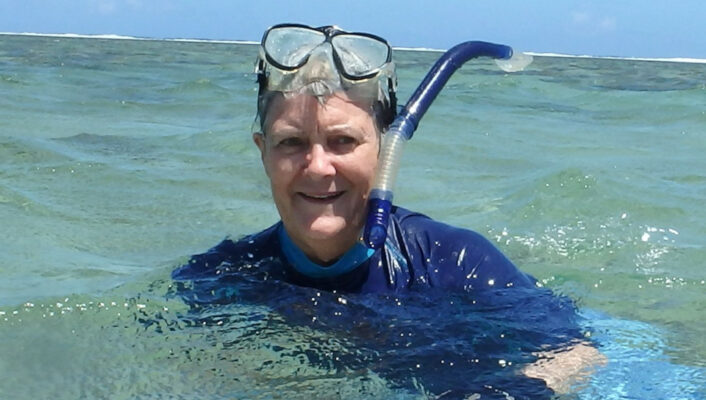Q&A with One Ocean Hub Researcher: Dr Gilianne Brodie

Dr Gilianne Brodie
Dr Gilianne Brodie is a marine scientist with a passion for the Ocean, its physical and biological resources, and how these Ocean resources are utilised and managed by humans. She is the Deputy Director of the Institute of Applied Sciences at the University of the South Pacific’s main Laucala campus in Suva, Fiji.
Why did you become interested in researching the ocean?
“I grew up very closely connected, both physically and emotionally, to the Ocean. My mother, who could not swim, spent many days with us at the seaside encouraging us to swim and explore the Ocean’s beauty and diversity. My father taught me to fish, and prepare the catch for cooking, from a young age. Then when I came to Fiji in 1982 my passion for the Ocean expanded greatly into coral reefs and other tropical coastal systems, which in turn led to my MSc in Suva Lagoon and PhD in marine biology at James Cook University in tropical Australia.”
What major concerns do you have related to the oceans?
“Fast increasing human populations and the associated development for providing resources to accommodate that exponential increase. Also how many people take the Ocean for granted and have a lack of appreciation of the need to look after our Ocean resources in the long term. Indirect Ocean benefits can sometimes be hard to see or explain so often humans do not value them well enough until they are lost. Some sectors of society seem to see the word ‘sustainability’ just as sustained growth and development rather creating balance and then doing business to conserve our resources for generations to come. Some Ocean benefits are hard to value directly in dollar terms as they may be not be related to big picture economies, but to our long term health or the of quality time we spend with our children.”
How would you describe your current research in three sentences?
“Challenging, intellectually-stimulating and with increased exposure lately to socio-economic, legal and policy perspectives of a wide range of stakeholders. Facilitating and acquiring new knowledge about the environment and how resources are used and valued by people with different cultural backgrounds to my own. I have always gravitated to learning from indigenous people and undertaking collaborative research on the environment in partnership with them.”
How does your work help us to re-think the current ocean issues/challenges?
“At the moment my work is contributing to the creation of a transdisciplinary research space at the University of the South Pacific and across the wider OOH. A space where we can work together and to listen to different ways of understanding and how to provide benefits to communities in a sustainable way. I have always been interested in how different disciplines overlap i.e., science/tourism/law/economics/governance/policy/education but this is the first time I have been able work in a new space to connect the synergies and disjuncts between them via research.”
What are the aspects of working in a collaborative environment such as the One Ocean Hub that you value the most?
“Strong encouragement and an opportunity to work on common issues with people from very different research backgrounds to myself. To be able to focus on applying our combined experience into improving solutions to ‘real world’ Ocean issues. Being with other researchers with similar goals but different approaches to knowing. And being with a large team that knows our Oceans are not just about extracting resources but about striving for sustainability and appreciating nature and the world around us.”
What keeps you going/motivates you in your research?
“Contributing research that addresses national government priorities, fills gaps in developing country knowledge and supports research capacity building for Pacific Island people. I am grateful to my research students for their willingness to share their knowledge about Pacific Island resources and communities with me so we can learn together. Watching my USP research postgrads reach their professional life goals is particularly rewarding because they always do it without losing sight of the foundation stone of ‘family’ in our lives.”
The One Ocean Hub aims to transform ocean governance. How does your research contribute to it?
“Here at USP we are involved with contributing to Fiji’s first national oceans policy which is likely to transform how government ministries and their stakeholders operate together on Ocean issues for many years to come. My research on invertebrates, land use and coastal ecosystems also links to women in fisheries and supporting the inclusion of marginalised voices in policy development and decision making processes.”